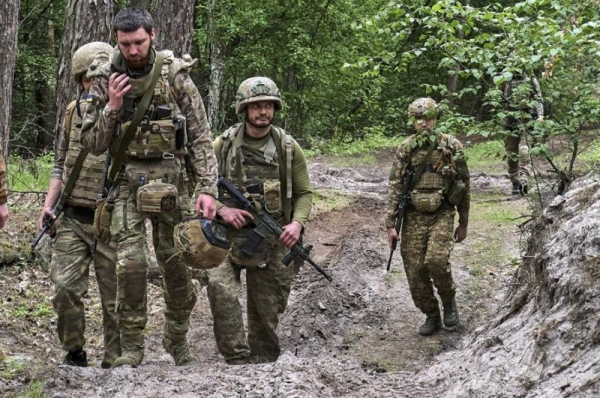Two U.S. generals speak, but is anyone listening?


Air Force Gen. Alexus Grynkewich, speaking at a NATO arms conference last week, said he was surprised how Ukraine gave its brigades the authority to buy their weapons and the money to do so. File photo by Sergey Kozlov/EPA
The inaugural NATO EuroLandWarfare was held in Wiesbaden, Germany, last week. The symposium and exhibition, which a large number of defense companies attended, was designed to reinforce NATO’s new dependency on a defense industrial base capable of providing hardware and particularly software not in years, but in days or weeks.
Two of the most senior U.S. generals in Europe were key speakers. Surprisingly, perhaps, comments made by both should have provoked major reactions. Neither did.
The first, Gen. Christopher Donahue, commander of U.S. Army Forces Europe and Africa, bluntly assessed how NATO’s military capability could neutralize the tiny Russian-controlled enclave of Kaliningrad.
Situated on the Baltic Sea and nestled between NATO member states Poland in the south and Lithuania in the north, Kaliningrad was retained by Russia following the collapse of the Soviet Union in 1991. Russia has reportedly stationed nuclear weapons in this small city state.
Donahue, in what some might call bragging, forcefully predicted that NATO allies, in the event of war, could “take that down [Kaliningrad’s defenses] from the ground in a timeframe that is unheard of and faster than we’ve ever been able to do.”
This smacked of Gen. George Patton. However, the Russian response so far has been muted and only has come from lawmakers, not the Putin government, who predictively have regarded this as a belligerent threat that could lead to World War III. The White House and the Pentagon have remained silent on the general’s statement.
One wonders who, if anyone, authorized the general to make this unduly provocative comment, no matter how correct. Was it in his script or ad-libbed, and were any of his seniors in Washington aware of or even concerned about the possible political consequences of the comment from Russia?
Is it possible that in today’s world, few take seriously credible statements from any source? And thus the general’s seemingly offensive remark passed relatively unnoticed and unmentioned.
Donahue’s boss, Air Force Gen. Alexus Grynkewich, became the U.S. European and NATO’s Supreme Allied Commander on July 4. He delivered the conference’s keynote address the next day. It was very well-received and well-delivered. Whether he knew of, authorized or approved Donahue’s statements on Kaliningrad is unknown. But in the question-and-answer period, Grynkewich inadvertently exposed two potentially grave weaknesses of the alliance.
His answer to the audience question of what has surprised him most in his new assignment was most relevant. Grynch, his pilot’s call sign, humorously responded that what surprised him most was that he got this job in the first place.
Second, and what was most revealing, was that his greatest surprise was how Ukraine gave its brigades the authority to buy their weapons and the money to do so. Grynkewich then argued that the United States must replicate this authority at the brigade level, implicitly reinforcing the conference’s challenge to defense industries.
What is very worrying about the general’s comments is that his last job was director for operations, or J-3, of the Pentagon’s Joint Staff. That he should have known about that weapons purchase policy leads to the question of how many of the Pentagon’s senior leadership lacked understanding of this and other novel ways Ukraine was waging the war despite intensive study and analysis of the conflict.
And while this may seem a trivial gap in knowledge, what else might the United States not know or understand about the war in Ukraine or Russia’s aims that could prove a debilitating weakness?
It was not news to this writer about Ukrainian brigades ordering weaponry tailored to their needs. In some cases, software upgrades were delivered in hours to the front line. This gave Ukrainian ground forces huge advantages in fighting a much larger Russian army.
Even supposing that this admission, and recommendation to emulate Ukraine, were accepted by the audience, that leads to a second grave weakness. Transforming or absorbing the Ukrainian example of delegating authority to ensure quick responses into NATO’s defense industrial base may be impossible today.
Can major defense industries, and more importantly their governments’ procurement processes, shift quickly from revising contracts aimed at producing highly technologically advanced, multibillion-dollar weapons systems in relatively small numbers to the Ukrainian model that stresses mass numbers of cheap systems and a highly diversified base of many small firms?
At present there are no answers to why Gen. Donahue’s response got little attention, and more importantly, what we do not know about the war or how to induce defense industries to make this tectonic transformation.
Harlan Ullman is UPI’s Arnaud de Borchgrave Distinguished Columnist; senior adviser at Washington’s Atlantic Council, chairman of a private company and principal author of the doctrine of shock and awe. His next book, co-written with Field Marshal The Lord David Richards, former U.K. chief of defense and due out next year, is Who Thinks Best Wins: Preventing Strategic Catastrophe. The writer can be reached on X @harlankullman.